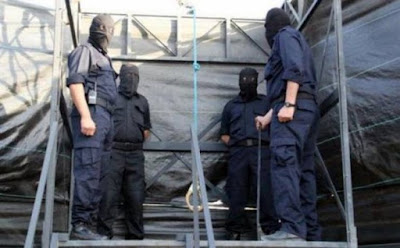Abbas signed the Second Optional Protocol to the International Covenant on Civil and Political Rights, adopted by the UN in 1989, aimed at abolishing the death penalty and stipulating, “No one within the jurisdiction of a state party to the present protocol shall be executed,” and “each state party shall take all necessary measures to abolish the death penalty within its jurisdiction.”
Public Prosecutor Ahmed Barak told Al-Monitor that current Palestinian Basic Law allows for the death penalty but requires that it be implemented with the approval of the Palestinian Authority (PA) president.
The PA in the West Bank currently applies the Jordanian Penal Code No. 16 of 1960, many articles of which stipulate the death penalty, while the Gaza Strip abides by the British Mandatory Penal Code No. 74 of 1936, which also provides for the death penalty. The new protocol will go into effect in three months. Barak added that authorities will take the necessary legal and legislative measures to amend Palestinian laws to align with the protocol.
Barak pointed out that countries around the world are divided into three schools: the first allows the death penalty, which is applied in certain states in the United States as well as most Arab countries; the second provides for the death penalty but does not actually apply it; and the third does not condone the death penalty and imposes a life sentence instead.
In the Palestinian territories, between 1994 when the PA was founded and the end of 2017, 41 executions were carried out, 39 of them in the Gaza Strip and two in the West Bank in 2001 that were approved by late Palestinian President Yasser Arafat. Among the executions carried out in the Gaza Strip, 28 were conducted after Hamas took over in 2007 without Abbas' approval.
Abbas allowed the death sentence to be carried out with his permission for the last time in 2005. The prisoners had been sentenced years before.
The proposed death penalty ban faces obstacles in the Palestinian territories where the PA lacks control, specifically in the Gaza Strip. Ahmed Abu Halabiya, who represents Hamas on the Palestinian Legislative Council (PLC) in Gaza, has rejected the protocol because, he told Al-Monitor, it violates laws the PA had passed since it was founded.
Abu Halabiya said the proposal doesn't serve Palestinian society’s best interest because the death penalty protects society. He said Abbas signed the protocol to win the approval of international bodies, which he did not name.
He noted that, regardless of Abbas' signature on the protocol to abolish it, Hamas will continue to support the death penalty, specifically against murderers, drug traffickers and those found guilty of colluding with Israel. He said Abbas' action is contrary to the Basic Law.
However, Rabah Muhanna, a member of the Popular Front for the Liberation of Palestine’s (PFLP) political bureau, told Al-Monitor, “When the PLC is asked to amend the Basic Law and remove the article that provides for the death penalty, PFLP representatives at the PLC will certainly support abolishing the death penalty and replacing it with a sentence as severe as life imprisonment.”
The protocol signing received broad acclaim among human rights institutions in the Palestinian territories, especially since these institutions have been calling on Palestinians for decades to abolish the death penalty, stating it is inhumane and ineffective as a deterrent to crime. Issam Younis, the director of Al-Mezan Center for Human Rights in Gaza, told Al-Monitor that many countries in the world that use the death penalty still have high crime rates.
Abbas' signature on the protocol is a step in the right direction, he said, “yet all conventions the PA recently joined need to be compatible with all Palestinian legislation so they can be applied in real life, otherwise they would be worthless.”
Yasser al-Amouri, a professor of international law at Birzeit University, called on Abbas to take the appropriate actions to suspend all provisions stipulating the death penalty in the Palestinian territories until the laws can be amended to create a legal system consistent with the international treaties and conventions the PA has joined.
Amouri said the PA’s accession to this protocol is an advanced step in defending the right to life. He called on Palestinian legislative authorities to find alternatives to laws that have become outdated and are incompatible with civilizational development.
Source: al-monitor.com, Ahmad Abu Amer, June 18, 2018
⚑ | Report an error, an omission, a typo; suggest a story or a new angle to an existing story; submit a piece, a comment; recommend a resource; contact the webmaster, contact us:
deathpenaltynews@gmail.com.
Opposed to Capital Punishment? Help us keep this blog up and running! DONATE!
"One is absolutely sickened, not by the crimes that the wicked have committed,
but by the punishments that the good have inflicted." -- Oscar Wilde












